人教版九年级英语Unit3知识点总结
人教版九年级英语unit3知识点
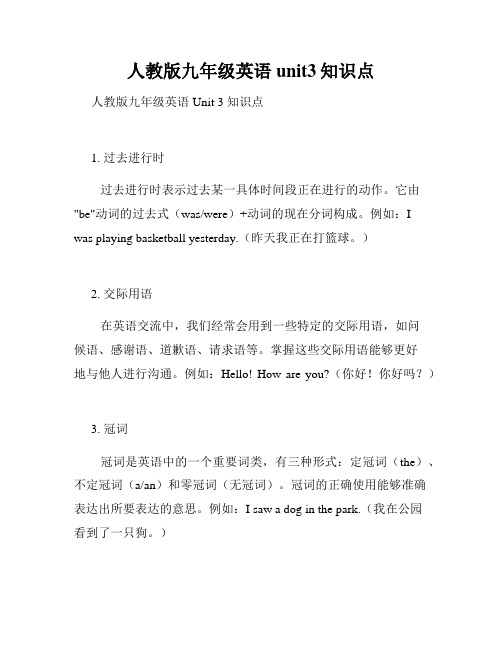
人教版九年级英语unit3知识点人教版九年级英语Unit 3 知识点1. 过去进行时过去进行时表示过去某一具体时间段正在进行的动作。
它由"be"动词的过去式(was/were)+动词的现在分词构成。
例如:I was playing basketball yesterday.(昨天我正在打篮球。
)2. 交际用语在英语交流中,我们经常会用到一些特定的交际用语,如问候语、感谢语、道歉语、请求语等。
掌握这些交际用语能够更好地与他人进行沟通。
例如:Hello! How are you?(你好!你好吗?)3. 冠词冠词是英语中的一个重要词类,有三种形式:定冠词(the)、不定冠词(a/an)和零冠词(无冠词)。
冠词的正确使用能够准确表达出所要表达的意思。
例如:I saw a dog in the park.(我在公园看到了一只狗。
)4. 询问和描述过去经历的表达方式当我们想询问或描述过去的经历时,可以使用一些特定的表达方式。
例如:Have you ever been to Beijing?(你去过北京吗?)Yes, I have been to Beijing before.(是的,我之前去过北京。
)5. 句型转换在英语学习中,我们常常需要进行句型转换,以提高我们的语言运用能力。
例如:I will go to the cinema.(我将去电影院。
)→Will you go to the cinema?(你将去电影院吗?)6. 非谓语动词非谓语动词是一种特殊的动词形式,常见的有不定式、动名词和动词-ing形式。
非谓语动词在句子中可以作主语、宾语、表语或状语等。
例如:Swimming is my favorite sport.(游泳是我最喜欢的运动。
)7. 时态的用法时态是英语中一个重要的语法点,不同的时态可以表示不同的动作发生时间。
如一般现在时表示目前的状态或经常的动作,现在进行时表示正在进行的动作等。
人教版九年级英语Unit3知识点总结
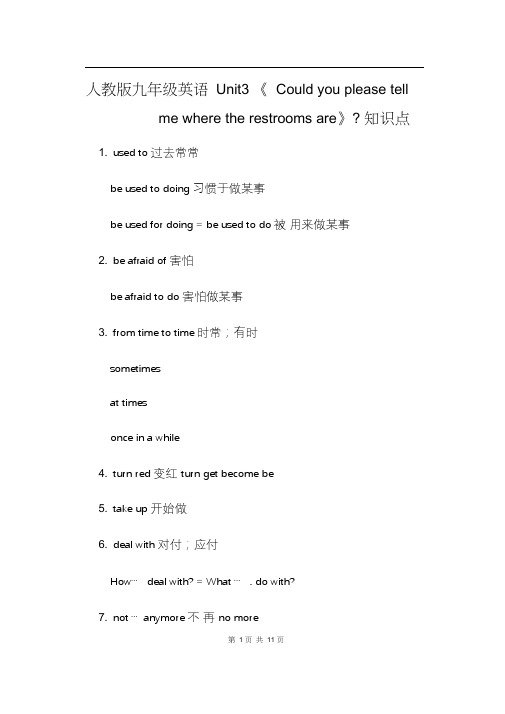
人教版九年级英语Unit3 《Could you please tell me where the restrooms are》? 知识点1. used to 过去常常be used to doing 习惯于做某事be used for doing = be used to do被用来做某事2. be afraid of 害怕be afraid to do 害怕做某事3. from time to time 时常;有时sometimesat timesonce in a while4. turn red 变红turn get become be5. take up 开始做6. deal with 对付;应付How⋯deal with? = What ⋯. do with?7. not ⋯anymore不再no more第 1 页共11 页not.. any longer no longer8. tons of attention 很多关注lots of=a lot of=plenty of9. worry about 担心be worried about10. be careful = take care = look out当心11. hang out 闲逛hang-hung-hung hang-hanged-hanged12. give up 放弃look forward to 盼望put off 推迟pay attention to 注意concentrate on 集中注意力have fun 玩的开心have trouble in doing 做某事有困难can't stan不d 能忍受⋯13. think about 考虑think over 仔细考虑think hard 苦苦思索14. a very small number of 极⋯少数的⋯⋯a large number of15. be alone 独处alone & lonely16. give a speech 做演讲第 2 页共11 页not.. any longer no longer17. 宾语从句;宾语从句在复合句中作主句的宾语。
人教版九年级英语unit3知识点
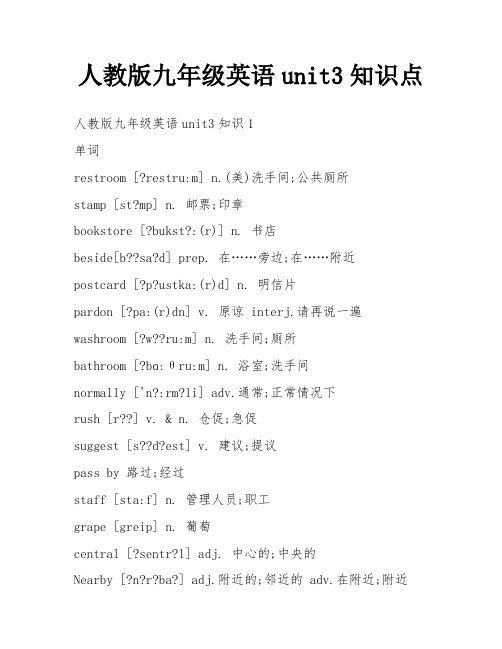
人教版九年级英语unit3知识点人教版九年级英语unit3知识1单词restroom [?restru:m] n.(美)洗手间;公共厕所stamp [st?mp] n. 邮票;印章bookstore [?bukst?:(r)] n. 书店beside[b??sa?d] prep. 在……旁边;在……附近postcard [?p?ustka:(r)d] n. 明信片pardon [?pa:(r)dn] v. 原谅 interj.请再说一遍washroom [?w??ru:m] n. 洗手间;厕所bathroom [?bɑ:θru:m] n. 浴室;洗手间normally ['n?:rm?li] adv.通常;正常情况下rush [r??] v. & n. 仓促;急促suggest [s??d?est] v. 建议;提议pass by 路过;经过staff [sta:f] n. 管理人员;职工grape [greip] n. 葡萄central [?sentr?l] adj. 中心的;中央的Nearby [?n?r?ba?] adj.附近的;邻近的 adv.在附近;附近Pardon me 抱歉, 对不起;什么,请再说一遍mail [meil] v. 邮寄;发电子邮件 n. 邮件east [i:st] adj. 东方的;东部的adv.向东;n.东方fascinating [?f?sineiti?] adj.迷人的;有吸引力的.Inexpensive[??n?k?spens?v] adj.不昂贵的Uncrowded [?n?kra?d?d] adj.不拥挤的;人少的convenient [k?n?vi:ni?nt] adj. 便利的;方便的mall [m?:l] n. 商场;购物中心clerk [kla:k][kl:rk] n. 职员corner [?k?:(r)n?(r)] n. 拐角;角落politely [p??laitli] adv. 礼貌地;客气地request [ri?kwest] n. 要求;请求direction [di?rek?n] [dai?rek?n] n. 方向;方位correct [k??rekt] adj. 正确的;恰当的polite [p??lait] adj. 有礼貌的;客气的 .direct [di?rekt, dai?rekt] adj. 直接的;直率的.speaker [?spi:k?] n.讲(某种语言)的人;发言者 whom [hu:m] pron. 谁;什么人impolite [??mp??la?t] adj. 不礼貌的;粗鲁的address [??dres], [??dres] n.住址;地址;通讯处.Underground [??nd?ɡra?nd] adj.地下的;n.地铁Parking lot n.停车场course [k?:(r)s] n. 课程;学科Italian [I?t?li ?n] adj.意大利\人的;n.意大利人\语Tim [tim] 蒂姆(男名)人教版九年级英语unit3知识2知识梳理【重点短语】1.a pair of 一对,一双,一副2.between A and B 在a和b之间3.on one’s / the way to 在去……的路上4.pardon me 什么,请再说一遍5.pass by 路过经过6.look forward to 盼望期待7.excuse me 打扰了请原谅8.get some information about 获取有关……的一些信息9.turn left\right 向左\向右转10.go past 经过路过11.a little earlier 早一点儿12.a good place to eat 一个吃饭的好地方13.in different situation 在不同的情况下14.on time 准时按时15.get to 到达16.have dinner 吃晚餐17.on one’s / \the right在右边18e on 快点请过来19.the shopping center 购物中心20.the corner of....... 的角落/拐角处21.lead into 导入,引入【重点句型】1.问路常用的句子:①Do you know whereis … ?②Can you tell me how can I get to …?③Could you tell me how to get to …?④Could/Will/Would you please tell me sth. 表示十分客气地询问事情Could you tell me how to get to the park?请你告诉我怎么才能去邮局好吗?2. decide to do 决定做…...She decided to go to have lunch. 她决定去吃午餐。
人教版九年级英语Unit3重点知识归纳
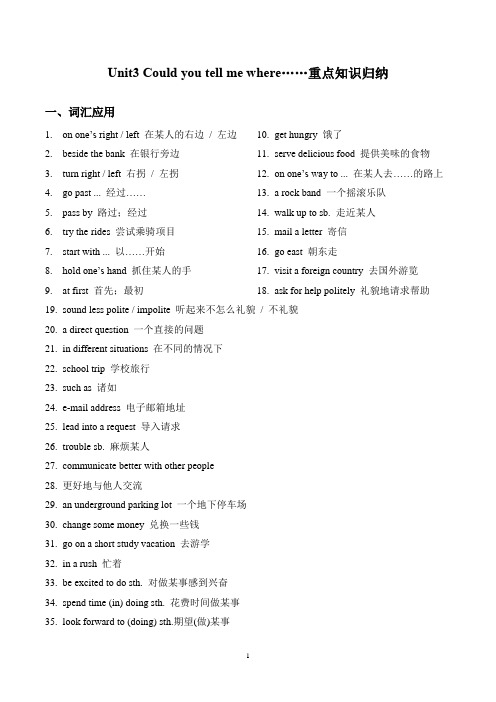
Unit3 Could you tell me where……重点知识归纳一、词汇应用1.on one’s right / left在某人的右边/ 左边2.beside the bank 在银行旁边3.turn right / left 右拐/ 左拐4.go past ... 经过……5.pass by 路过;经过6.try the rides 尝试乘骑项目7.start with ... 以……开始8.hold one’s hand 抓住某人的手9.at first 首先;最初10.get hungry 饿了11.serve delicious food 提供美味的食物12.on one’s way to ... 在某人去……的路上13.a rock band 一个摇滚乐队14.walk up to sb. 走近某人15.mail a letter 寄信16.go east 朝东走17.visit a foreign country 去国外游览18.ask for help politely 礼貌地请求帮助19.sound less polite / impolite 听起来不怎么礼貌/ 不礼貌20.a direct question 一个直接的问题21.in different situations 在不同的情况下22.school trip 学校旅行23.such as 诸如24.e-mail address 电子邮箱地址25.lead into a request 导入请求26.trouble sb. 麻烦某人municate better with other people28.更好地与他人交流29.an underground parking lot 一个地下停车场30.change some money 兑换一些钱31.go on a short study vacation 去游学32.in a rush 忙着33.be excited to do sth. 对做某事感到兴奋34.spend time (in) doing sth. 花费时间做某事35.look forward to (doing) sth.期望(做)某事e on 加油;快点儿37.pardon me 抱歉,对不起;什么,请再说一遍二、重点句型1.问路常用的句子:①Do you know where is … ?①Can you tell me how can I get to …?①Could you tell me how to get to …?①Could/Will/Would you please tell me sth.表示十分客气地询问事情Could you tell me how to get to the park?请你告诉我怎么才能去邮局好吗?2. decide to do 决定做…...She decided to go to have lunch. 她决定去吃午餐。
Unit3笔记人教版英语九年级全册
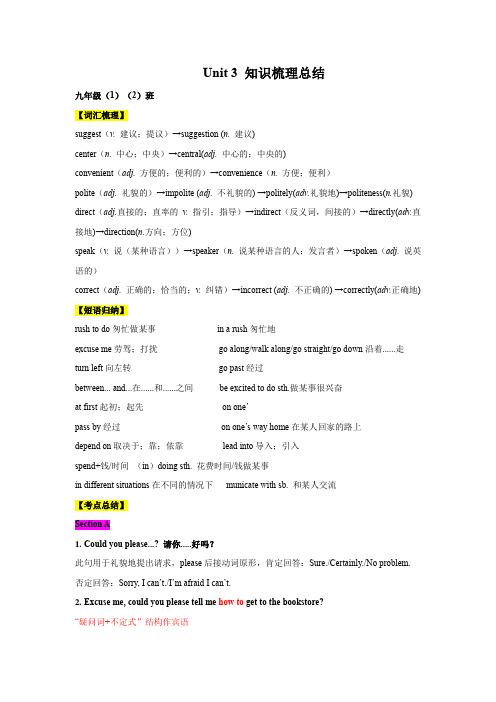
Unit 3 知识梳理总结九年级(1)(2)班【词汇梳理】suggest(v.建议;提议)→suggestion (n. 建议)center(n.中心;中央)→central(adj.中心的;中央的)convenient(adj. 方便的;便利的)→convenience(n. 方便;便利)polite(adj.礼貌的)→impolite (adj. 不礼貌的) →politely(adv.礼貌地)→politeness(n.礼貌) direct(adj.直接的;直率的v. 指引;指导)→indirect(反义词,间接的)→directly(adv.直接地)→direction(n.方向;方位)speak(v.说(某种语言))→speaker(n.说某种语言的人;发言者)→spoken(adj.说英语的)correct(adj.正确的;恰当的;v.纠错)→incorrect (adj. 不正确的) →correctly(adv.正确地)【短语归纳】rush to do匆忙做某事in a rush匆忙地excuse me劳驾;打扰go along/walk along/go straight/go down沿着......走turn left向左转go past经过between... and...在......和......之间be excited to do sth.做某事很兴奋at first起初;起先on one’pass by经过on one’s way home在某人回家的路上depend on取决于;靠;依靠lead into导入;引入spend+钱/时间(in)doing sth. 花费时间/钱做某事in different situations在不同的情况下municate with sb. 和某人交流【考点总结】Section A1.Could you please...? 请你.....好吗?此句用于礼貌地提出请求,please后接动词原形,肯定回答:Sure./Certainly./No problem.否定回答:Sorry, I can’t./I’m afraid I can’t.2.Excuse me, could you please tell me how to get to the bookstore?“疑问词+不定式”结构作宾语①how to do e.g. Please tell me how to deal with these old books.②what to do e.g. Could you please tell me what to do next.③when to do e.g. We haven’t decided when to start.3.问路及指路的表达方式.问路:Could you please tell me the way to...?Where is...?Do you know if there is a ... near here?Can you tell me how I can get to...?指路:Go along/Walk alone/Go down the street until...Turn left at the second turning/crossing.4.The bookstore is on your right, beside the bank.beside (prep.) 在......旁边;在.....附近 e.g. The bookstore is beside the mall.besides (prep.) 除.....之外(还)... e.g. We also like chemistry besides physics.5.You don’t need to rush.(1)作动词,意为“仓促;匆忙行事”rush out of冲出rush into 冲进......里(2)作名词,意为“仓促;匆忙”in a rush仓促;匆忙作名词,还可意为“特别忙碌的时期”at the rush hour在(交通)高峰期6.I was scared at first, but shouting did help.在英语中,通常把助动词do/does/did放在动词原形前,用以加强语气,意为“真的;的确”。
人教版九年级Unit 3知识点总结
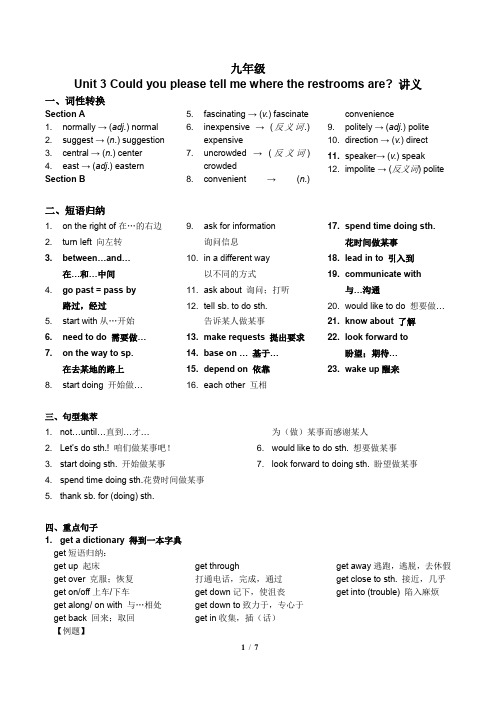
九年级Unit 3 Could you please tell me where the restrooms are? 讲义一、词性转换Section A1. normally → (adj.) normal2. suggest → (n.) suggestion3. central → (n.) center4. east → (adj.) eastern Section B5. fascinating → (v.) fascinate6. inexpensive → (反义词.)expensive7. uncrowded → (反义词)crowded8. convenient → (n.)convenience9. politely → (adj.) polite10. direction → (v.) direct11. speaker→ (v.) speak12. impolite → (反义词) polite二、短语归纳1. on the right of在…的右边2. turn left 向左转3. between…and…在…和…中间4. go past = pass by路过,经过5. start with从…开始6. need to do 需要做…7. on the way to sp.在去某地的路上8. start doing 开始做…9. ask for information询问信息10. in a different way以不同的方式11. ask about 询问;打听12. tell sb. to do sth.告诉某人做某事13. make requests 提出要求14. base on … 基于…15. depend on 依靠16. each other 互相17. spend time doing sth.花时间做某事18. lead in to 引入到19. communicate with与…沟通20. would like to do 想要做…21. know about 了解22. look forward to盼望;期待…23. wake up醒来三、句型集萃1. not…until…直到…才…2. Let’s do sth.! 咱们做某事吧!3. start doing sth. 开始做某事4. spend time doing sth.花费时间做某事5. thank sb. for (doing) sth.为(做)某事而感谢某人6. would like to do sth. 想要做某事7. look forward to doing sth. 盼望做某事四、重点句子1. get a dictionary 得到一本字典get短语归纳:get up 起床get over 克服;恢复get on/off上车/下车get along/ on with 与…相处get back 回来;取回get through打通电话,完成,通过get down记下,使沮丧get down to致力于,专心于get in收集,插(话)get away逃跑,逃脱,去休假get close to sth. 接近,几乎get into (trouble) 陷入麻烦【例题】1. buy a newspaper 买一份报纸buy 为非延续性动词,不能与how long及for引导的表示一段时间的状语连用。
人教版英语九年级Unit 3 重点知识归纳及讲解
九年级上Unit 3知识清单Section A一、重点短语1. get some magazines/stamps买些杂志/邮票2. a pair of shoes 一双鞋3. ask for the information about the town 询问关于这个小镇的消息4. pass (by) a bookstore = go past/by a bookstore 走过一家书店5.beside the back = next to/ at the side of the bank 在银行旁边6. go to the second floor 去二楼7. get some postcards 买一些卡片8. try the rides 尝试些乘骑项目9. go on sth继续某事10.be excited to do sth兴奋地做某事be excited about sth/doing sth.11. start with = begin with 以...开始end with 以…结束12. hold my hand 抓住我的手13. come on 加油;得了吧14. walk up to 走向15. go east along 沿着…(向东)走16. on one’s way to sp在去某地的路上17. get angry 饿了18. at the door 在门口19. mail a letter 寄封信20. the Italian restaurant nearby 附近的意大利餐馆二、重点句型1. I was scared first, but shouting did help. 该句话中, “did”的用法是助动词表强调,起加强语气的作用。
同类例句如:I’m not joking, we did go camping last weekend. The summer holiday does start next Monday.2. 英语常见问路/指路表达方式:1) 问路Excuse me/Pardon me, where is the nearest post office?Excuse me, which is the way to the nearest post office?Excuse me/Pardon me, can/could you (please) tell me the way to the post office?Excuse me/Pardon me, how can I get to the nearest post office?Could you please possibly tell me how to get to the library?Excuse me/Pardon me, do you know if there’s a post office around here?Would you please tell me if there is a bank nearby?I wonder +…可加以上所有句型。
人教版英语九年级全册Unit3 单元知识点归纳
Unit3 单元知识点归纳一、重点词汇:stamp rush suggest mail convenient politely polite impolite request direction correct speaker二、短语:1. excuse me 劳驾,请原谅,打搅2. get to 到达3. get some magazines 得到一些杂志4. have dinner 吃晚餐5. get some information about 获取有关…….的一些信息6. a pair of 一双,一对,一副7. on one’s / the right 在右边8. turn left / right 向左/ 右拐9. between…..and….. 在…..和…..之间10. go past 经过,路过11. come on 快点儿,过来,加油12. on one’s way to 在某人去…….的路上13. a little earlier 早点儿14. the shopping center 购物中心15. a good place to eat 一个吃饭的好地方16. the corner of …….的角落/ 拐角处17. in different situations 在不同的情况下18. lead in to 导入,引入19. on time 准时,按时20. look forward to 盼望,期待21. pardon me 什么,请再说一遍三、固定短语:1. not…..until…… 直到…..才……2. Let’s do sth. 让我们做某事吧3. start doing sth. 开场做某事4. spend time doing sth. 花费时间做某事5. thank sb. for (doing) sth. 为〔做〕某事而感谢某人6. would like to do sth. 想要做某事7. look forward to doing sth. 盼望,期待做某事四、重点句型:1. Excuse me, could you please tell me how to get to the bookstore?打搅一下,请你告诉我如何去书店好吗?2. Excuse me, do you know where I can get some postcards?请问,你知道在哪里可以买到一些明信片吗?3. I wonder where we should go next.我想知道接下来我们应该去哪儿。
人教版九年级全一册英语Unit3单元语法知识点总结
人教版九年级全一册英语Unit3单元语法知识点总结本单元重点短语的具体用法1. a pair of:“一对,一双,一副”,用于表示两个相同或相关的物品。
例如:I need a pair of shoes for the party.(我需要一双参加派对的鞋子。
)2. between A and B:“在A 和B 之间”,用于描述两者之间的关系或位置。
例如:The library is between the school and the hospital.(图书馆在学校和医院之间。
)3. on one's / the way to:“在去……的路上”,表示正在前往某个地点的过程中。
例如:I saw a beautiful flower on my way to school.(我在去学校的路上看到了一朵美丽的花。
)4. pardon me:“什么,请再说一遍”,用于请求对方重复或澄清刚才说的话。
例如:Pardon me, I didn't catch what you said.(请再说一遍,我没听清你说的。
)5. pass by:“路过,经过”,指从某个地方经过但不做停留。
例如:I pass by the park every day on my way to work.(我每天上班路过公园。
)6. look forward to:“盼望,期待”,后面接名词或动名词,表示对某件事情的期待。
例如:I'm looking forward to seeing you again.(我期待再次见到你。
)7. excuse me:“打扰了,请原谅”,用于引起别人的注意或表示歉意。
例如:Excuse me, could you open the door for me?(打扰一下,你能帮我开一下门吗?)8. get some information about:“获取有关……的一些信息”,用于表示获取关于某个主题的信息。
人教版九年级英语unit3知识点总结
Unit 31.邮票;印章 stamp 集邮 collect stamps2.在。
旁边 (介词)beside3.v&n. 仓促;急促 rush①You don’t need to rush.你不需要着急② rush to do sth 赶紧做。
仓促做。
急促做。
③ be in a rush to do sth 匆忙做。
4.v.建议;提议 suggest suggestion 可数名词①suggest sb. doing sth ②suggest+that引导的宾从v.建议;提议 advise n.advice 不可数名词advise sb. to do sth5.路过,经过 pass by sp= go past sp6.邮寄一封信件 mail a letter7.昂贵的 expensive-----不昂贵的inexpensive拥挤的 crowded------- 不拥挤的 uncrowded有礼貌的polite --------不礼貌的 impolite有礼貌地 politely----- 没礼貌地 impolitely8.便利的,方便的 convenientIt’s convenient for sb. to do sth.做某事对某人来说是方便的。
9.拐角;角落 corner at/ on the corner of …在拐角处 in the corner 在角落里10.直接的;直率的 direct直接地;直率地 directly方向;方位 direction11.adj.正确的; v.改正 correct12.住址;地址;通讯处 address13.park n.公园 v。
停车No parking! 禁止停车 parking lot 停车场14There be 句型“有” There be sth+介词短语某地有某物①.be 动词遵循就近原则②There will be … 将有③There is/ are going to be 将有④There be sb. doing sth 有某人正在做某事There is a girl dancing in the classroom.⑤There be sth to do .There is nothing to worry about. 没有什么担心的。
- 1、下载文档前请自行甄别文档内容的完整性,平台不提供额外的编辑、内容补充、找答案等附加服务。
- 2、"仅部分预览"的文档,不可在线预览部分如存在完整性等问题,可反馈申请退款(可完整预览的文档不适用该条件!)。
- 3、如文档侵犯您的权益,请联系客服反馈,我们会尽快为您处理(人工客服工作时间:9:00-18:30)。
Unit 3 Section A 1a-2d 知识提纲一、词法及句型1. beside 介词,在……旁边=next to2.go past = pass v. 路过I pass a market when I go home .3.between prep. 在……之间,用于两者between…and …在……和……之间,前后可以是两个不同的人,物及时间among prep.在……之间,用于三者或三者以上I sat down between Tom and Jim .Don’t eat snacks between meals . 正餐之间不要吃零食。
They live among the mountains . 他们住在群山之间。
4.pardon ,pardon me 主要用于没听清对方说话时,恳请对方再说一遍。
Excuse me 主要用于吸引别人的注意,有“麻烦,打扰”之意。
用于事前。
Sorry 对不起,主要用于做错事后道歉用的。
二、交际运用——有关问路的用语1)Excuse me , 劳驾①where is ……? ……在哪?②how can I get to ……?我怎样去……?③which is the way to ……?去……是哪一条路?④can you tell me the way to the …please ?你能告诉我去……的路吗?⑤could you tell me how to get to the …please ?你能告诉我怎样去……吗?⑥can you tell me how I can get to the …please ?你能告诉我怎样去……吗?⑦can you tell me where the nearest…is ?你能告诉我最近的……在哪吗?2). How far is it ? 有多远?Is it far from here ? 离这儿远吗?3). Which bus should I take ? Which number do I need ?我该乘几路车/指引方向:1). Walk / Go along / down the road /the street ;沿着这条路/ 街走。
Walk / Go along /down the road /the street to the end .沿着这条路/ 街走到尽头Walk / Go along /down the road /the street until you reach the second trafficlights . 沿着这条路/街一直走到第二个交通灯那儿。
Go across the bridge . 从桥上走过去。
2. Turn left / right at the second crossing . 在第二个十字路口向左/ 右拐。
Take the first turning on the left / right .在第一个拐弯处向左/右拐。
3. It’s about four hundred meters along on the left / right .大约在前方400米左右。
It’s about 10 minutes’ walk .= It’s about 10 minutes on foot 大约十分钟的路程It’s about 4 kilometers away . 大约四公里远行走方式:You’d better take No.3 bus 你最好乘3 路车。
Take the No3. bus and it will take you straight there .乘三路公共汽车,会把你直接带到那儿。
The No.72 bus will take you there .72路公共汽车会带你到那。
位置关系:It’s over there /on the left / right . 在那边/ 在左边/ 在右边It’s next to / in front of / behind / outside the …It’s at the end of the street .It’s between …and …At the end of the road you’ll see the …6.You can’t miss it . 你就不能错过。
Unit 3 Section A 3a-4c 知识提纲(P19-20)一、词法及句法1. suggest v. 建议,提议→n. suggestion (c)n.suggest sth. (to sb.) )( 向某人)建议某事suggest doing sth . 建议做某事I suggest at the station .A meetB to meetC meetingD met2. until conj. 直到……为止,主句动词必须是延续动词。
not …until …直到……才……主句动词可以是延续动词,也可是暂短性动词。
Let’s wait until the rain stops. 咱们等到雨停吧。
I didn’t go to bed until my father came back .3. pass by = go past =pass 路过He passed by without greeting me .他经过我面前时,没打招呼。
4.center n . 中心,中央→adj. central 中心的类似变法的单词还有:5. need 情态动词+ 动词原形“必须”常用在否定句中needn’t=don’t have to实义动词,“需要”,主语为人时need to do sth,主语为物时need doing sth .Unit 3 Section B 1a-2b 知识提纲一、词形变化1. fascinate v. 使迷人→adj. fascinted 入迷的f ascinating 迷人的,有吸引力的,2. expensive adj. 昂贵的→ opp. inexpensive 不贵的3. crowd v. 拥挤→ crowded adj. 拥挤的→uncrowded 不拥挤的,宽敞的4.polite adj. 礼貌的→adv. politely 礼貌地→opp. impolite 不礼貌的5.direct adj. 直接的→adv. directly 直接地→ n. direction 方向6.speak v. → n. speaker 发言者7. who 主格宾格whom7.Italy n. 意大利→ Italian 意大利的,意大利人的二、词法及句型1. fascinate v. 使迷人→adj. fascinted 入迷的,主语为人f ascinating 迷人的,有吸引力的,主语为物英语中以ing结尾的形容词,通常修饰物,以ed结尾的形容词通常修饰人,类似的形容词还有:It’s convenient for sb. to do sth. 做某事对于某人来说是很方便的。
在上海乘公共汽车旅游是很便利的。
It’s convenient (travel)by bus in Shanghai .3.spend (spent , spent ) v. 花费,主语为人。
常用句型:Sb. + spend + 时间或金钱+ (in)doing sth.Sb. + spend + 时间或金钱+ on sth .pay (paid , paid ) v. 付款,主语为人,常与for 连用pay for sth .take (took . took ) v. 花费时间常用句型;It takes sb. some time to do sth.cost(cost ,cost ) v. 值,花费主语为物。
I nearly two hours cleaning the room .A spentB tookC paidD costUnit 3 Section B 3B-self check 知识提纲一、短语1. introduce oneself 自我介绍2. ask for 要,要求3.look forward to(介词)期盼,期望4.wake up 醒来,叫醒5.in a rush 匆忙地二、词法与句法1.happen vi. 发生sth. happen to sb. 某人出了某事。
What happened to you ? 你怎么了?A car accident happened to her this morning . 今天上午她发生了车祸happen to do sth. 碰巧做某事I happened (meet)my friend in the street .Sth + happen + 时间/ 地点某时/某地发生了什么事The story happened in 2003.2.Thank you for sth ./ doing sth .Thank you for your letter . 感谢你的来信。
Thank you for helping me . 感谢你帮助我。
3. meet sb. for the first time . 第一次遇见某人。
4.polite adj 有礼貌的be polite to 对……有礼貌be polite to do sth .It’s polite (say) hello to the teacher in the morning .5.look forward to 期待,期望to 为介词。
—I’m looking forward to my parents soon . What about you ?—Me , tooA seeB seeingC saw6.wake up vi. 醒来After I woke up , I quickly got up .我醒来后迅速起床了。
vt. 叫醒,弄醒动副短语,宾语为代词时放中间。
I will wake you up before your alarm clock rings .我会在你的闹钟响之前叫醒你。
巩固提升一、单项填空(本大题有20小题,每小题1分,共20分)在每小题的四个选项中,选出可以填入空白处的最佳答案。
( )1.—Must I be home before eight o'clock, Mum?—No, you ________.But you have to come back before ten o'clock.A.needn't B.can't C.mustn't D.may( )2.—Tom wants to know if you will have a picnic tomorrow.—Yes.But if it ________, we'll play chess instead.A.will rain B.rained C.is raining D.rains( )3.He suggested that you should ________there tomorrow.A.going B.went C.goes D.go( )4.—I like the dress, but I'm ________ I haven't got enough money.—Don't worry.I don't mind ________ you some if you like.A.afraid; lending B.glad; lendingC.afraid; to lend D.glad; to lend( )5.—Show me the map, please.I wonder ________.—Look, it's here, in the east of China, near Taiwan Province.A.where is Diaoyu Island B.where Diaoyu Island isC.what is Diaoyu Island like D.where Island is Diaoyu( )6.—Sally, I went to the concert last night.How big the symphony hall is!—So it is.It is ________ to hold more than one thousand people.A.big enough B.enough big C.too big D.too small( )7.I'm not sure whether he will come here, because it ________ his feeling.A.stands for B.depends onC.lives on D.agrees with( )8.We joined them________ Xiao Ming.A.predicting B.including C.serving D.announcing( )9.On the way ________ the mountain village, we found the local houses different from ours.A.to B.by C.at D.on( )10.Her mother goes to work ________ bus every morning.A.by B.at C.on D.in( )11.—I'm doing a survey.Could you tell me ________?—Sure.I usually go to work at 7:00 a.m.A.why you go to work B.how you go to workC.when you go to work D.who you go to work with( )12.—You look ________.What's up, sir?—I can't find my ticket, but it's time to check in.A.sleepy B.hungry C.tired D.worried( )13.—That actor often joins in different activities in Beijing.Do you know ________?—For 5 years.A.how soon he will come back B.how long he has stayed thereC.how long has he stayed there D.how often does he go there( )14.—How can I get more information about the donation to Ya'an?-Youcane*****************************************.A.on B.in C.at D.by( )15.It is important ________ people ________ learn team spirit.A.of; of B.of; to C.for; to D.to; to( )16.Please hold on to your dream ________ one day it comes true.A.if B.until C.unless D.though( )17.Julie's father ________ to London last month.He ________ there three times.A.went; had gone B.has gone; has beenC.went; has been D.has been; had gone( )18.—I feel stressed from time to time.Could you give me some advice?—________ sharing your worries with your parents?A.Why don't you B.How aboutC.Why not D.Would you like( )19.—Would you mind ________ in the dining hall?—Of course not.A.not to smoke B.not smokingC.to smoking D.smoke( )20.Students should learn how ________ problems.A.solve B.solvingC.can solve D.to solve二、书面表达(每个人都是独一无二的,都有与众不同之处,人们喜欢你一定会有很多原因。
